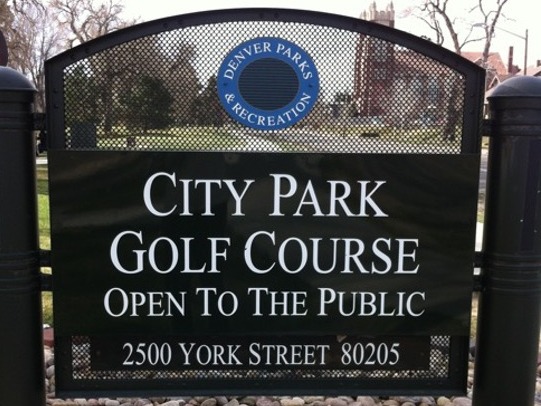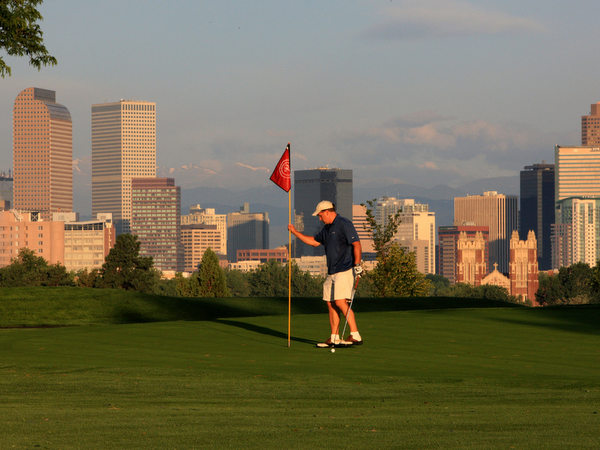As the meat of the golf season approaches, it’s pretty much business as usual at City Park Golf Course in Denver. But, in all likelihood, this is the last springtime in a while that that will be the case.
The course, which opened 105 years ago, is expected to close late this year and not reopen for business until sometime in 2019 — though it’s possible pending litigation could affect plans.
As part of the contentious Platte to Park Hill stormwater drainage project the city of Denver has planned, a newly redesigned 18-hole City Park Golf Course will be used in part for stormwater detention, assuming nothing derails the plans. The idea is to integrate stormwater detention areas into the course to “help protect some of the city’s most at-risk neighborhoods from flooding” — specifically those north and northwest of the site, according to the City and County of Denver website.
As part of the project, the redesigned City Park Golf Course will “temporarily hold and slow floodwaters while protecting the course from damage” during major storms. … “Outside of major storms, the area will remain a dry, fully-functioning golf course.”
Miles Graham from GBSM, which handles communications and community outreach for the city on this project, said that things will largely remain status quo for this golf season.
“Other than some exciting news about which of the teams will be doing the final design and the construction on the redesign, there’s not going to be any change or disruption this golf season,” he said. “It’s going to be business as usual.”
Ed Mate, the CGA’s executive director, grew up as a regular at City Park GC. He played his first 18-hole round of golf there, and to this day, he says he’s played more at the historic layout than anywhere else.
Asked his feelings about the changes that are planned, Mate said, “It’s bittersweet. It’s where I grew up playing. With the nostalgia and all that, obviously it’s hard to see (the existing course) go away. But you have to be realistic. There’s a way to transform public property that incorporates very-much-needed (public safety-related changes) and modernizes the course like at (CGA-owned and operated) CommonGround. It’s sad to see the old course go, but I’m glad to see it used for the greater good of the community. If it was becoming a parking lot or a high-rise, it would be a different matter, but it’s staying a golf course.”
The plan calls for a course architect and construction team to be selected to design and build a new 18-hole layout at the site, with that choice expected to be made public this summer after contract finalization. The finalists are Robert Trent Jones II, with Landscapes Unlimited; iCon Golf Studio with Hale Irwin Golf Design, with Saunders Construction; and Dye Design, with SEMA Construction. Among their Colorado work, Trent Jones designed Ute Creek Golf Course in Longmont, Icon Golf Studio the Glacier Club in Durango, and Dye Design Riverdale Dunes in Brighton.
City Park GC was originally designed by Scotsman Tom Bendelow. After public input was solicited on the matter, it’s hoped that some of the most iconic elements of the existing course and site can be incorporated into the new layout.
“City Park Golf Course is a very special place and so are the people there,” said Keith Soriano, currently a Colorado PGA assistant executive director, who served as the PGA head professional at City Park from 2009 through 2012. “Whoever they choose (for the redesign team), I hope they maintain some of the uniquesness of the course.
“Because of the confined nature (of the site), I hope they stay with small greens, with approach shots having to be placed well and on the correct side (of the pin).”
Soriano understands why some people are unhappy with the impending changes, but is glad there still will be a golf course at the site.
“Anytime you change something historical as that, that’s been there 100 years” there’s bound to be some controversy. “But that’s the cost of progress,” he said. “At least there will be a golf course there. People will have access to green space (amid) the concrete jungle, and to PGA professionals, but the look of it may change.”
Added Mate: “It’s a really good golf course as it is. It’s underappreciated. It has really fun greens that are challenging. It’s a classic Tom Bendelow course. Whatever they replace it with won’t be the same. You can’t recreate the charm.
“But I recognize the stormwater challenge, and the city needs to be proactive. I trust the engineers (and other experts). The way I look at it, if that work is needed, then it’s needed. And it could be that the course they replace it with is a fun, sporty layout.”
 Integrating stormwater detention areas into golf courses isn’t unusual. Examples in the Denver metro area are CommonGround Golf Course in Aurora and Lakewood Country Club. That certainly came into play at CommonGround during the September 2013 flooding as more than 14 inches of rain fell in just six days. At one time, nearly half the course was under water, at some points 6 feet deep of it. It took nearly a month before the water drained off the course completely, and by then eight holes were damaged severely and the turf on five greens died. But the good news was that the Westerly Creek Dam that borders the course did its job — flood control — by protecting land and real estate in nearby areas of eastern Denver and northwestern Aurora.
Integrating stormwater detention areas into golf courses isn’t unusual. Examples in the Denver metro area are CommonGround Golf Course in Aurora and Lakewood Country Club. That certainly came into play at CommonGround during the September 2013 flooding as more than 14 inches of rain fell in just six days. At one time, nearly half the course was under water, at some points 6 feet deep of it. It took nearly a month before the water drained off the course completely, and by then eight holes were damaged severely and the turf on five greens died. But the good news was that the Westerly Creek Dam that borders the course did its job — flood control — by protecting land and real estate in nearby areas of eastern Denver and northwestern Aurora.
“Sometimes the best interest is to be a true citizen in the larger picture,” Mate said. “Public safety concern has to supersede (golf course matters). As hard as it was to see CommonGround flooded in 2013, this community asset served a greater good. It kept (homes, businesses and the people that use them) from the effects of the flood. The fact that they’re keeping (City Park) as a golf course, that’s a great outcome. Times change.”
But that doesn’t mean that the old layout won’t be missed. Both Soriano and Mate specifically noted how much they like the 18th hole at City Park.
Dating back more than a century, City Park certainly has a unique history to draw upon.
Among those who have played the course are former heavyweight boxing champion Joe Louis, outstanding all-around athlete Babe Didrikson Zaharias, Charlie Sifford and Jonathan Kaye of PGA Tour fame, and 1952 Olympic long jump champion Jerome Biffle.
Some of those players — and many others — were attracted to City Park because it was known as a place where there was plenty of “action” — in other words, where a little cash was known to be exchanged via golf bets.
A founding member of the City Park-based East Denver Golf Club, Judge James Flanigan, helped knock down racial barriers in state golf tournaments when he was refused the right to play in the CGA Match Play Championship in 1961. The next year, the CGA changed its policies and admitted minority clubs, including the East Denver Golf Club.
Another thing that’s made City Park distinctive is the makeup of its players. To put it succinctly, the course is among the most diverse in Denver. While many of the various men’s club golfers played with their own groups at City Park, gambling eventually integrated people of different races.
“When I started playing there (in the late 1960s), the men’s clubs were pretty much segregated, but the gambling games weren’t,” Colorado Golf Hall of Famer Tom Woodard, a former PGA head professional at City Park, as well as a former director of golf for the City of Denver, said when the course celebrated its 100th anniversary. “The color of money — green — was the only thing that mattered there. I thought that was pretty amazing.
“The thing I remember most is the gambling games. Every Friday and Saturday you could find a game — but you better bring your ‘A’ game. You better be ready to play. If you were a good player from a public course, you eventually made your way to City Park.”
With the impending course redesign, the city is considering various priorities for the site, according the the city’s website. Based on community outreach sessions, those include improved/updated practice facilities, expanding/improving The First Tee of Denver program that’s based at the course, and relocating/redesigning the clubhouse, among other things.
“City Park is certainly one of the most beloved municipal courses in Denver. It’s got a ton of history,” Graham said. “The city is fully committed to making sure this redesign retains all of those great aspects of City Park and looks for opportunities to update it further.
“That eight-month collaborative process we did with the community really heavily referred back to the history of the course, making sure we retain the character of the course. But there will be opportunities to make some updates that would improve playability.”
Courses closing for more than a year, then reopening, certainly isn’t unprecedented in the Denver metro area. Just in recent years, Coal Creek Golf Course in Louisville closed in the wake of the 2013 flood before being rebuilt and returning to business in 2015. And Thorncreek Golf Course in Thornton closed last fall for renovation, with officials anticipating a 2018 reopening.
For more information on the City Park Golf Course plans, CLICK HERE.
While big changes are planned for City Park GC, it’s not the only City of Denver course that’s been in the news. The city is in the running to host a three-day outdoor musical festival at Overland Park Golf Course starting in 2018, most likely in September of that year. If a deal is struck, Overland would be closed for 4-6 weeks, according to the city website. Assuming the musical festival comes to Denver, city officials say they anticipate an initial five-year contract.
Denver is one of two cities being considered to host the music festival. A decision on the matter is expected in late spring of this year.
For more information about the Overland proposal, CLICK HERE.


